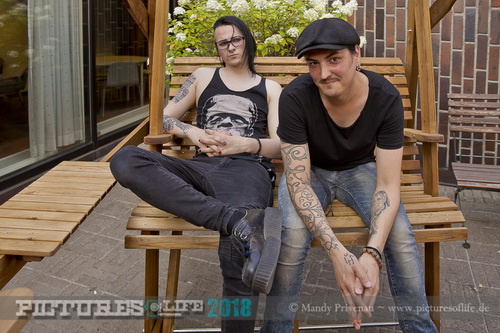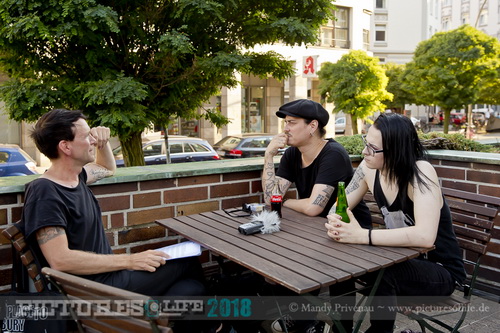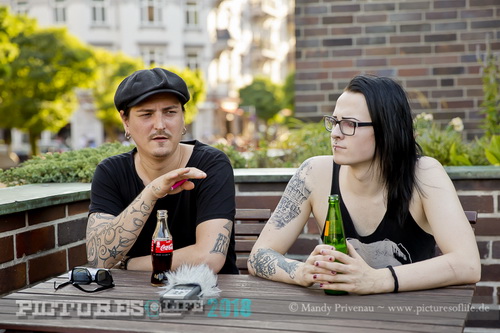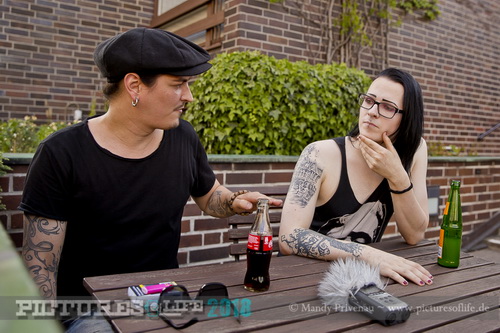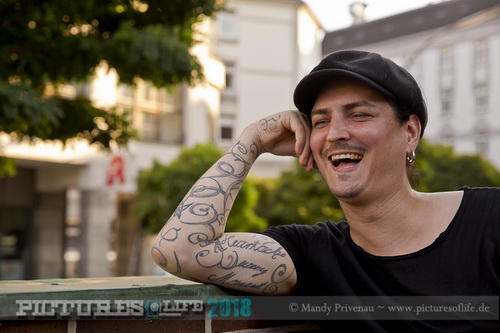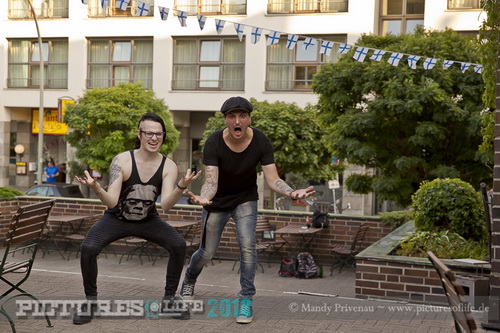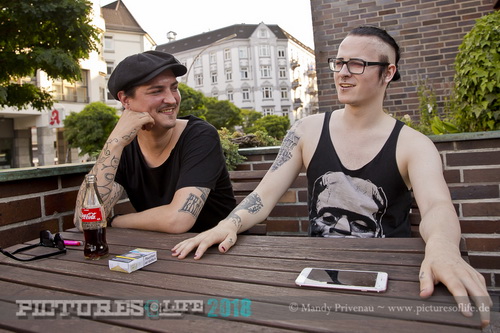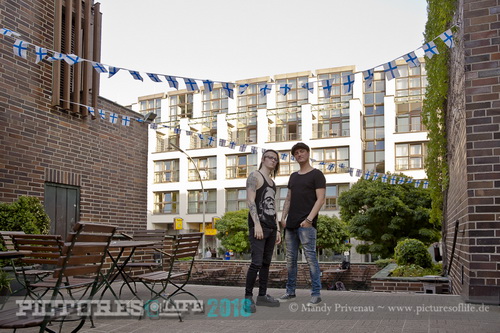
Standing out in the dark crowd – Release sat down with Florian Grey
Posted In Interviews,Slider by Jimi Nilsson
The sheer number of acts arising on the German goth rock scene is almost unrivaled and the scene is fraught with competition between a never-ending stream of new bands entering the scene. To stand out is quite a challenge. One of these bands that recently have started to catch some attention in Germany is far from being a newcomer and have been on the scene in different constellations since 2006, and they also have a special connection to Finland.
Release Magazine sat down with singer Florian and drummer Yannick of Florian Grey at the Finnish church café in Hamburg and had a chat about their latest album “Ritus”, the German goth rock scene and why Finland is such a great country.
Florian Grey started out as a one man solo act after Florian left his former band Eves End in 2011. After a few years of acoustic shows and lots of guest vocalist appearances in a wide range of bands, he released his debut album “Gone” on Echozone, coated in a dark rock sound in the Finnish goth rock tradition.
2018 saw the arrival of the second album “Ritus” and a transition from solo act to “go more in the band direction”. Today, the band consists of Florian Grey, Von Marengo, Simon Zlotos and Yannick “Rage” Bockelmann, and the sound has taken another twist towards yet another influence on the Finnish goth rock scene – “Ritus” could be something coming out of the studio of The 69 Eyes. And the connection and love for Finland goes even deeper.
“You should pronounce ‘Ritus’ as you were Finnish”
Really nice to finally meet and congratulations to your second album. It’s a different album album with much more pronounced guitars than on your debut album “Gone”. What has changed from the recordings of “Gone”?
- Thanks! But you should pronounce “Ritus” as you were Finnish (laugh).
The producer of “Gone” and me started in a classic poppy way, on the piano; all big pop artists do it that way (laugh). We were just trying around and I [Florian] started to sing, and then we recorded and reworked it a bit. I gave the pre-mixes to Chris of Lord of the Lost and he added some guitars, even cello, and put it into one big frame since it was too demo-like and sounded more like a compilation than an album.
This album entails less down-tempo piano parts and I, and the band, decided to do go more in the band direction rather than me doing it solo – and we wanted it to rock! Most of the songs are written on acoustic guitar and that’s a major difference. We wanted a faster and heavier sound, even a bit darker but still mainstream enough for radio play, that’s how we discussed it actually. Even the neighbor should say “OK, I like this song” and not only people into this kind of music, meaning that we’re more open to new people and genres.
Did you had any particular influences?
- There are a lot of influences in the music and we’re basically open to every genre. Doing albums strictly to fit one genre is boring and we didn’t want to do a “Gone 2”, just go for harder things and the guys [the band] love it as well. “My Babylon” is more an alternative kind of thing, “Bereft” is inspired more of the nineties Finnish sound, and “Bluecifer” is a rockier song rooted in metal and with an American high school guitar solo on there (laugh). So yes, it’s kind of different and a mash up of genres and we’re going to build on that in the future as well.
You worked with Hilton Theissen on “Ritus” who was lead-singer in Akanoid and today is the singer in Seadrake, but also a guitarist in death metal act Dark Millennium. What made you come together to record “Ritus” and what impact did he have on the development of your sound?
- He is like a metal-pop bitch (laugh), that’s what we usually say but in a nice way – he is actually very versatile. The new Seadrake album is an amazing electro album and I [Florian] love that, I love his voice, and in the Dark Millennium video he is wearing a Florian Grey T-shirt (laugh).
We made the demo and then went to the studio three times and really worked on the songs, and he had quite an influence. We said “Let’s do an eighties darkwave song” and then we wrote this song on the album, “The Unknown Pleasure”, and said “Of course, I’m totally into electro, let’s do this” and we wrote the song in the studio.
He is great to work with! He did the mixing and the mastering, and we’re really satisfied with what he did for us. He is also like a commander when it comes to the vocals; I did all the layers in three and a half days, and that was pretty tough, but he pushed me in a good way. Really great guy!
“Ritus” really sounds Finnish goth rock, similar to bands such as The 69 Eyes, and to enhance the link to Finland we also met up at the Finnish church today. What’s your connection to Finland?
- Thank you for the compliment and I [Florian] can’t wait for their new album; I’m a huge fan of “Back in Blood”.
I actually have a connection to The 69 Eyes, I’m friends with Bazie [guitarist]. We met like ten or eleven years ago and ended up drinking a lot of Jack Daniels shots, something I never had been drinking before that day, and we talked a lot. And he’s fun, even if we haven’t met in years he remember what we did the last time we met (laugh).
I used to be a lot in Finland. When I was a bit younger I was a huge fan of Negative, Him and even End of You, and some other bands from Finland. I have a lots of friends there and know Helsinki really good, and Tampere as well. Every time I arrive in Helsinki I love the vibe there.
My Finnish friends living in Berlin moved back to Helsinki and Tampere, and what I really like is that Finnish don’t do small talk, they say something when there is something to say. They’re introvert from the beginning but when you get to know them it’s a friendship for life. They are very honest and if they like you they really like you – or the opposite (laugh). I’m pretty much like that myself; maybe I was Finnish in my previous life. Perkele! (laugh)
But I like the music, it’s harder music, and I like the European bands not the American bands. It’s a more “get back to the roots” in the sound of the north, more honest and genuine.
But since you like the Finnish scene that much and considering the sound of bands like Nightwish that work quite much with massive orchestrations, is that something for you in the future as well?
- Haha. That’s fun because we were talking earlier today about our new album, or the demos to be recorded in the beginning of next year, and I [Florian] said to Yannick “I want more boost”. The point is that I love the music of Nightwish especially with Tarja but also Anette, and Floor – her voice is perfect for Nightwish. She’s a really good singer and can sing classic rock and even growl, that’s amazing! Her singing technique is really unique and many young singers can learn a lot from her.
Yes, I [Florian] really like Nightwish but Yannick doesn’t like them at all [turning to Yannick and laughing].
But I [Yannick] like big orchestration like Dimmu Borgir or Septic Flesh with a huge metal sound and classical influences, and we were talking about doing some more classically influenced stuff; it’s just like when you have a hard sound but push it at bit more with big orchestrations.
But there are some classical parts on “Gone” and we would like to use that a bit more – but just in one song on the next album (laugh).
Most German bands prefer to sing in English and I’ve always try to understand why, since it usually makes it harder for them to play the UK or the States. However, you choose English. What’s the reason for it?
- It was important already from the beginning since I [Florian] wrote and expressed my thoughts much better, and I feel more comfortable singing in English. It’s always a challenge to sing in German because you have to breathe differently and sing completely different, so I would never record a full album in German, but maybe one or two songs. I sang some pop songs in German when I was younger and I still have a major idol, a German pop singer – not schlager (laugh) – who was an idol in my late teens.
But the band always communicate in English, because Fede, our guitarist, is Italian it’s natural. Mama mia, he is from la familia! (laugh). If we would start singing in German Fede wouldn’t understand a word (laugh).
You’re inspired by old poems and poets and have William Blake as a favorite poet.
- It’s an inspiration but I’m very careful with using extracts of poems in lyrics, since you don’t know in which lawyer’s hands they will turn up later, haha. But I get a lot of inspiration from William Blake, Edgar Allan Poe, Oscar Wilde and I’m always looking for inspiration in old books. And historical things of course; “My Babylon” is about my time in Berlin and I compare Berlin to Babylon in the lyrics. “Bluecifer” is about Lamasthu, the Indian goddess. When I’m not sure what to write about I do some historical research.
But it’s interesting since my experience is that many bands on the goth and darkwave scenes are quite interested in history and religion. What’s your take on that?
- I can’t speak for everyone but I’ve noticed the same. It’s not that I necessarily decide from the start that it has to be gothic lyrics, I write about what I feel in a more dramatic way. I was always a drama kid when I was young and my mom always told me to be less dramatic about things. I wrote texts that were kind of deep for someone that young. That may be why we ended up on the dark scene.
The German goth scene: Legions of bands
“There are more bands at a time when there is less income, making it harder than ever to earn a living from making music”, The Human League’s singer Phil Oakey said in a radio show interview in the UK last year. He’s in synthpop, but it applies to dark rock as well.
Goth has always had a huge fanbase in Germany and whilst most people involved in the scene not really call themselves goth, it’s massive scene. Being a consumer of goth music in Germany is being in heaven; because of the extensive market there are always a few concerts each week in the major cities and countless of new albums being released every year. The downside to it is that we need to filter out the great stuff.
Florian and Yannick bear witness of facing a never-ending struggle to get heard and find a way onto the bigger festival stages.
The gothic scene in Germany is massive if you consider how many of those bands playing Wave Gotik Treffen are German. Do you find it difficult to carve a space for yourself in the music industry?
- At the moment it’s like every genre is fucking around with each other to make it onto the goth scene, there is no typical gothic music anymore. You have this Neue Deutsche Härte, this metal stuff – bands like Rammstein, Oomph!, Eisbrecher and a lot of similar bands but there’s too many of them! Many of these bands also sound really bad because they try to sound like something they can’t play, and everybody want to scream “Ich bin” (laugh).
I [Florian] like Oomph! which have been around for quite a while, even my dad is a big Oomph! fan. I like bands just like that and also Rammstein and Eisbrecher but most of bands similar to us aren’t good, you can’t re-invent something like that and do it better. This is just an impression I get; everyone can do what they want but it gets boring in the end when there’s too many bands doing the same thing.
But the future of the gothic scene is to combine genres but go with your heart and not try to be or sound like something you’re not. You can do something similar to Rammstein but you really need to put your own color on it, your own imprint, and make it new.
How do you have to act to stand out on the big scene?
- Play loads of shows and try to stay honest, don’t dress like there’s a ceremony on stage. We are just the same on stage as off stage; we’re not on stage to do an evil show with dresses and stuff, we want to take our crowd on a journey. When you buy a ticket to a show for your hard earned money you want to get an experience that take you away from everyday thoughts, and you want to go home with a nice feeling. That’s what we do.
I don’t think that much about the competition. There is a competition that no one talks about; every band want to be the best but you really don’t talk about it. But why should you see it as competition when you can help each other? It’s better to walk down the road together. It doesn’t matter if you or a reviewer think that some bands are bad and some are good because the people decide in the end what they want to listen to.
But there are also loads of festivals to play in Germany and I guess it’s a very important window to get new listeners. How difficult is it to get into those festivals or to get stage time in Germany in general?
- If you look at all the line-ups of the major festivals, it seems like it’s the same bands, that’s my opinion [Yannick], it’s always the same line-up. Wave Gotik Treffen though make some great bookings and invite quite many underground bands no one ever heard of.
The problem is when you have a reached a certain level you can’t go any further unless someone opens the door for you, like a major booking label, and we are slowly getting to that point. Let’s see if there’s someone opening the door for us; everybody working hard in music deserves a chance. But when I [Florian] see the line-ups I don’t get bothered anymore; all we want to do is to play, and we do play everything if there’s just time enough to do it.
But we’re still going to do music even if we don’t have a major success. Our record label will not throw us out because of that, it’s not that kind music that usually meet the standards for successful music; our label’s mission is to put out good music.
Regular shows mixed with acoustic sets
In contrast to most German bands insisting on singing in German thus making it difficult to do shows in non-German speaking countries (Rammstein might be the only exception), Florian Grey have no language barrier to go out of Germany since they prefer English. However, being booked for shows is all about getting through to booking agencies and venues – and then we’re back to facing the problem of too many bands on the goth scene. In the end it’s all about promotion and exposing your music and talent in social media.
Speaking of live shows; how many shows have you made outside Germany? Do you try to get more gigs abroad or is the scene too small for you abroad?
- In the beginning of Florian Grey, when I [Florian] played the acoustic shows, I made two shows in Helsinki but let’s see what happens in the future. We would love to play if they just booked us and would probably play everywhere if it’s a good place. In a way you have to consider yourself that in the role as a musician to be a blogger, just to promote yourself, as well (laugh).
I’m quite sure that if I wouldn’t be in a band I would only have two or three friends on Facebook (laugh) and not use Instagram at all, but it’s also too easy to get addicted to it. It’s a full-time job with no pay. Of course there are good sides of it, especially on how to connect with your fans; you don’t get your information from the big magazines anymore, and they only did made up stories anyway. You can write or talk directly to the band. Today you can create your scandals directly (laugh).
For a few years ago you also made a set of acoustic sessions which is a completely new take on your music, when you strip it off almost everything. Will you combine acoustic shows with ordinary rock shows in the future as well?
- Let’s see, if we grow a bit bigger we might do acoustic sets in between – I liked that with Nightwish on their 2012 tour. On the other hand you can do another tour after the ordinary, one that is completely acoustic.
This year it won’t happen because I’m [Florian] really tired of it, we played quite many the last time. It’s not fair to the new album either with its heavier rock sound, but next year we will definitely do an acoustic tour, hopefully with a live cellist since my cousin plays cello.
If you consider the next two years, what’s the ambition for Florian Grey after two albums? What’s the next step?
- Sex, drugs and rock‘n’roll (laugh). Keep on playing, doing new music and try to reach the stars (laugh). No, but we will try to go as far as we can. We’re all doing this as a full-time job already, our lives are nothing but music.

